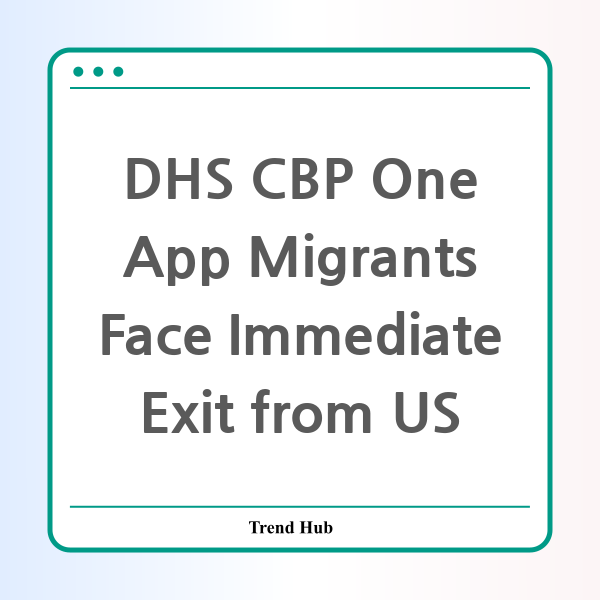* This website participates in the Amazon Affiliate Program and earns from qualifying purchases.

Are migrants who utilized the CBP One app in jeopardy of immediate expulsion from the U.S.?
In a shocking development, thousands of migrants who entered the United States using the CBP One app, initially designed to streamline the asylum process, are now being urged to leave the country “immediately.” This shift in policy marks a severe departure from the protections afforded to them under the Biden administration.
The CBP One app was intended to alleviate pressure at the southern border by allowing migrants to schedule appointments at legal ports of entry instead of crossing illegally. Under this program, migrants had been granted a temporary legal status known as humanitarian parole, allowing them to enter the U.S. legally and work for a period of two years.
However, recent communications from the Department of Homeland Security (DHS) have left many feeling vulnerable. Migrants have been notified via email that their parole has been revoked, and they are now subject to potential deportation if they do not leave the U.S. immediately. This announcement raises critical questions about the future of these individuals and the broader implications for immigration policy.
While the Trump administration pursues stricter enforcement of immigration laws, it appears that those who benefitted from the CBP One app are caught in a legal limbo. Many are uncertain whether the cancellation of their parole protections will affect their ongoing applications for asylum or Temporary Protected Status. As highlighted by immigration advocates, confusion and fear are pervasive among this population, especially for those who are actively engaged in legal proceedings.
The recent news has drawn attention to a dual narrative: on one hand, the administration’s efforts to enforce immigration law more aggressively, while on the other, the mishandling of the expectations set for migrants who relied on the app to enter the U.S. legally. Migrants like Y., a Venezuelan woman, have expressed their anxiety over the sudden revocation of their status, fearing for not just their future in the U.S., but also for their safety given their often harrowing journeys to seek asylum.
As the situation evolves, many are left questioning the administration’s commitment to the humanitarian principles that were central to the CBP One program's launch. The rebranding of the app to "CBP Home" and its new focus on facilitating "self-deportations" signals a stark policy shift aimed at enforcing stricter border control.
It's crucial to examine the impact of these changes not just on individual lives, but also on the U.S. immigration landscape overall. The consequences of such policies extend beyond legal ramifications; they forge fears within communities, hinder economic opportunities, and challenge the very fabric of what America has long represented in terms of offering refuge for those fleeing violence and persecution.
As we move forward, it will be essential for advocacy groups, policymakers, and communities to engage actively in discussions surrounding immigration, ensuring that humane and fair practices are upheld. The situation surrounding the CBP One app serves as a stark reminder of the complexity of immigration issues and the critical need for compassionate solutions.
The implications of the DHS's recent actions are profound, not only for the affected migrants but also for the broader narrative surrounding U.S. immigration policy. The path forward demands a careful and compassionate approach that honors the rights of those seeking asylum while addressing the realities of border security.
* This website participates in the Amazon Affiliate Program and earns from qualifying purchases.